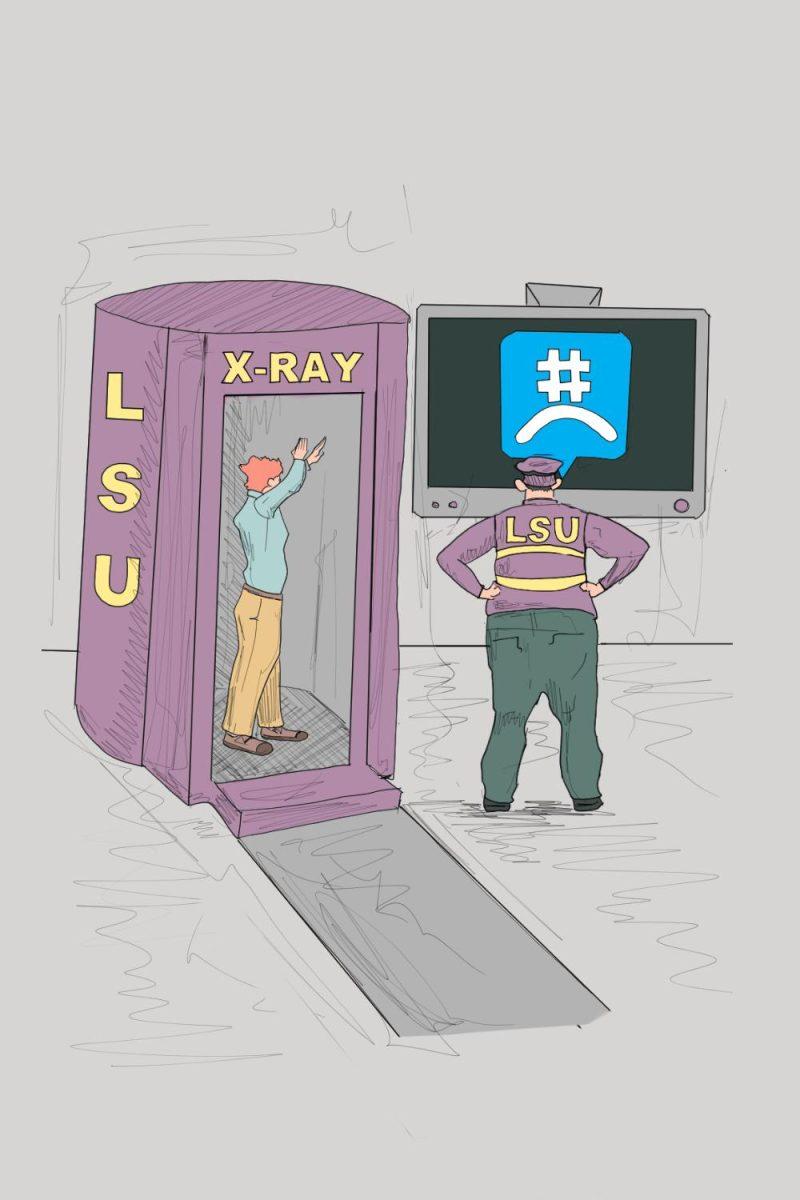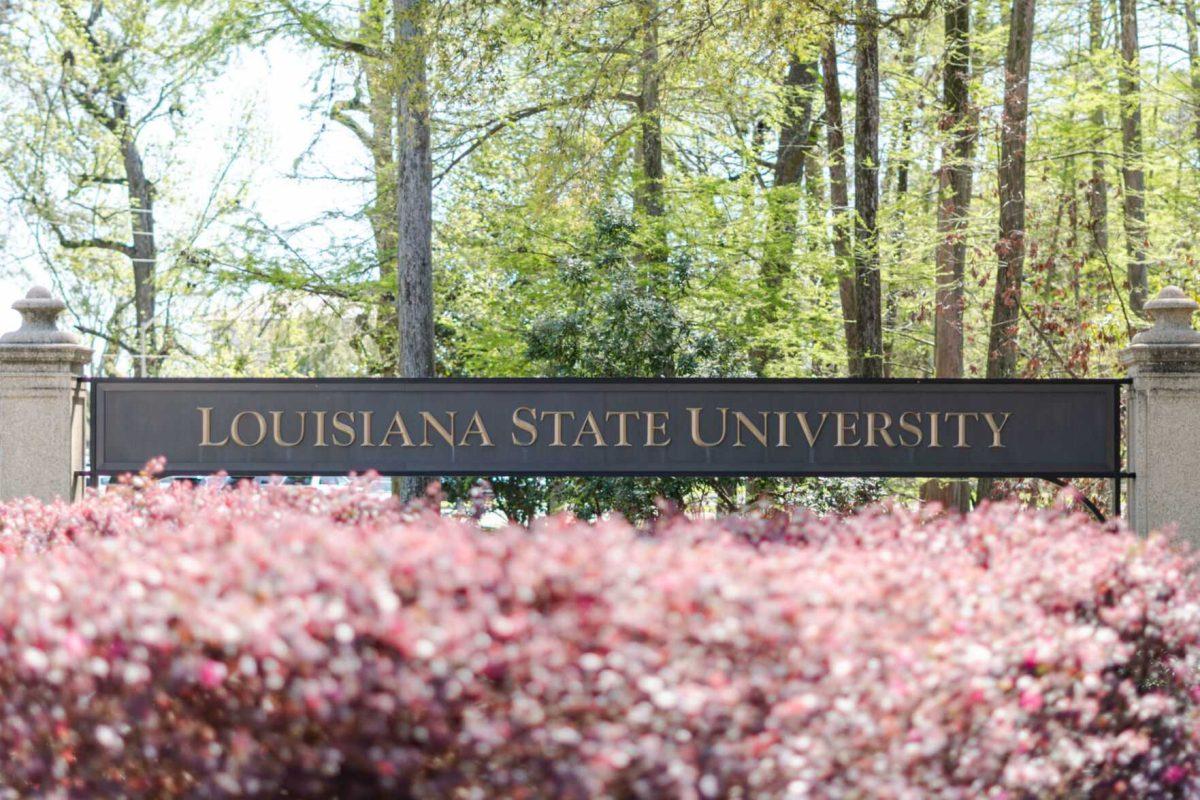Many class group chats at LSU have begun to go silent.
English freshman Taylor Pisanie received an email from the office of Student Advocacy & Accountability on March 5 indicating that she was involved in a possible violation of the LSU Student Code of Conduct during an art history exam. The email alleged that she may have shared information with other students via GroupMe during the exam.
In early March, students started to leave group chats, and some groups were outright deleted when rumors surfaced that some students were contacted by SAA regarding cheating in group chats.
Rather than risk being accused of cheating, many students left groups — even if no cheating was involved.
Many University students use the popular messaging app GroupMe in their courses to connect with classmates. The app is useful for sharing study materials, like Quizlets, organizing study groups, or seeking general help with coursework. However, Pisanie’s art history class this semester revealed problems that could arise when using GroupMe.
Pisanie said a few students discussed cheating in the chat, but many more students, including Pisanie, chimed in to condemn the potential cheaters, with a warning that LSU takes cheating in group chats very seriously and everyone in the group could be at risk. One by one, students began to leave the group.
“I left,” Pisanie said. “Then everyone else left, so it was never used for cheating ever. And then we still all got called in.”
SAA held a meeting with Pisanie and many of her classmates on March 8. Pisanie said many of her classmates that had spoken in the chat on the day of the alleged incident, including those that either did not contribute to the cheating or condemned it, were present. She said one classmate in particular did nothing but ask for a Scantron.
“We had a big group meeting, and there were a bunch of kids, like the kid who asked about the Scantron,” Pisanie said. “He was like, ‘Why am I in here?’ And [the SAA representative] kept skirting around the question. [They] would not directly tell him why he was in there or what he personally was being accused of.”
Pisanie said these accusations brought her great mental anguish. She found it difficult to concentrate and study, and she said her grades were affected negatively.
Pisanie emphasized that she in no way condones cheating, whether via GroupMe or using other methods.
“If we were actually cheating, [punish us] for it, whatever,” Pisanie said. “But nobody cheated. They’re saying that they wanna get us for collusion, which is talking about it, or attempting to cheat.”
Pisanie conceded that she had joked about cheating earlier in the group, but emphasized that it was clearly a joke and was in no way connected to this incident.
Although SAA is unable to comment on individual cases, Associate Dean of Students and Director of Student Advocacy & Accountability Jonathan Sanders offered some explanation as to how a case involving GroupMe may be handled by SAA.
“We do not have a specific policy for group chats, but individual students are held accountable for academic misconduct with the Code of Student Conduct and involvement in group chats could be a violation of the Code if they are used for purposes that would be a violation of the Code,” Sanders said.
Sanders explained Code of Student Conduct policy 10.1.G. Other Academic Misconduct states, “attempting to commit, or assisting someone in the commission or attempted commission of an offense defined in this section, or any other act of Academic Misconduct.”
“Therefore, if students discussed how they would share answers on an assignment, [10.1.G] might be appropriate, as well as others if information is shared in a group message that might fit,” Sanders said. “Depending on what is shared, it could also fall under 10.1.A Collaboration, 10.1.B Collusion, or others depending on the situation.”
Sanders said the nature of the GroupMe app makes it difficult to determine which students are guilty and which are innocent.
“In addition, because it is not possible to know who reads messages in a group chat, there is no way of knowing if a student looked at those messages and/or utilized them, so again this might be a Code violation,” Sanders said. “When looking at these types of cases, we look to see what was shared and by whom and who could have benefited from the information and have an academic advantage over other students. As mentioned in the Code, high standards of academic integrity are crucial for the University to fulfill its educational mission.”
GroupMe Support also responded to the events, confirming that officials from the University had reached out and requested access to message transcripts.
“Indeed [we were contacted] about students using our services to cheat, which is not right, but it was never mentioned to our terms of services as well that such action is violating it,” GroupMe said in an emailed statement. “The violation that will defy our terms of service would be harassing another user, which is not the case here. So we refer the person to Microsoft in order to get the transcript since we do not have such option to acquire that.”
According to Microsoft’s privacy statement, private information, including content like emails or messages, may be shared if it is requested through valid legal processes, such as law enforcement or another government entity.
GroupMe said they do not feel they are responsible for students who decide to use their app to cheat.
“The students are just taking advantage [of] the perks of social media, and the discipline of students is not our responsibility,” GroupMe said in the statement.
On March 14, Pisanie received the news that she was found responsible in her case. She said she was devastated about the decision, and feels the odds are stacked against her. She struggles to see a resolution to her problem.
“They have me painted into a corner where I can’t decline the decision and take it up with the hearing panel because I might get a worse punishment,” Pisanie said. “I honestly just want to leave LSU. It’s not even worth it to me anymore.”
Pisanie said she feels that SAA is treating students unfairly in this case. She believes SAA is punishing all students involved because of the difficulty for the office to discern guilt.
Pisanie and her mother, Marianne Covington, plan to appeal the decision. Covington wholeheartedly believes her daughter is innocent.
“I have seen everything, and I have seen no evidence of her attempting or assisting someone in attempting to cheat,” Covington said. “She did not contribute to the conversation in a manner that was attempting to cheat. All the accountability office kept telling me was that is my opinion.”
Covington feels that SAA has blown the situation out of proportion. Covington said she has consulted other students, faculty and an attorney who have all agreed that SAA’s decision doesn’t make sense.
“I had been telling her all along, ‘Don’t worry about this. It’s obvious you didn’t do anything, so just put it out of your mind. Don’t stress over it,’” Covington said. “Then they come back with [a guilty ruling.]”
Covington is currently in discussion with an attorney on how to approach Pisanie’s appeal.
LSU students using GroupMe for class could be in violation of Code of Student Conduct
March 21, 2018
groupme
More to Discover







